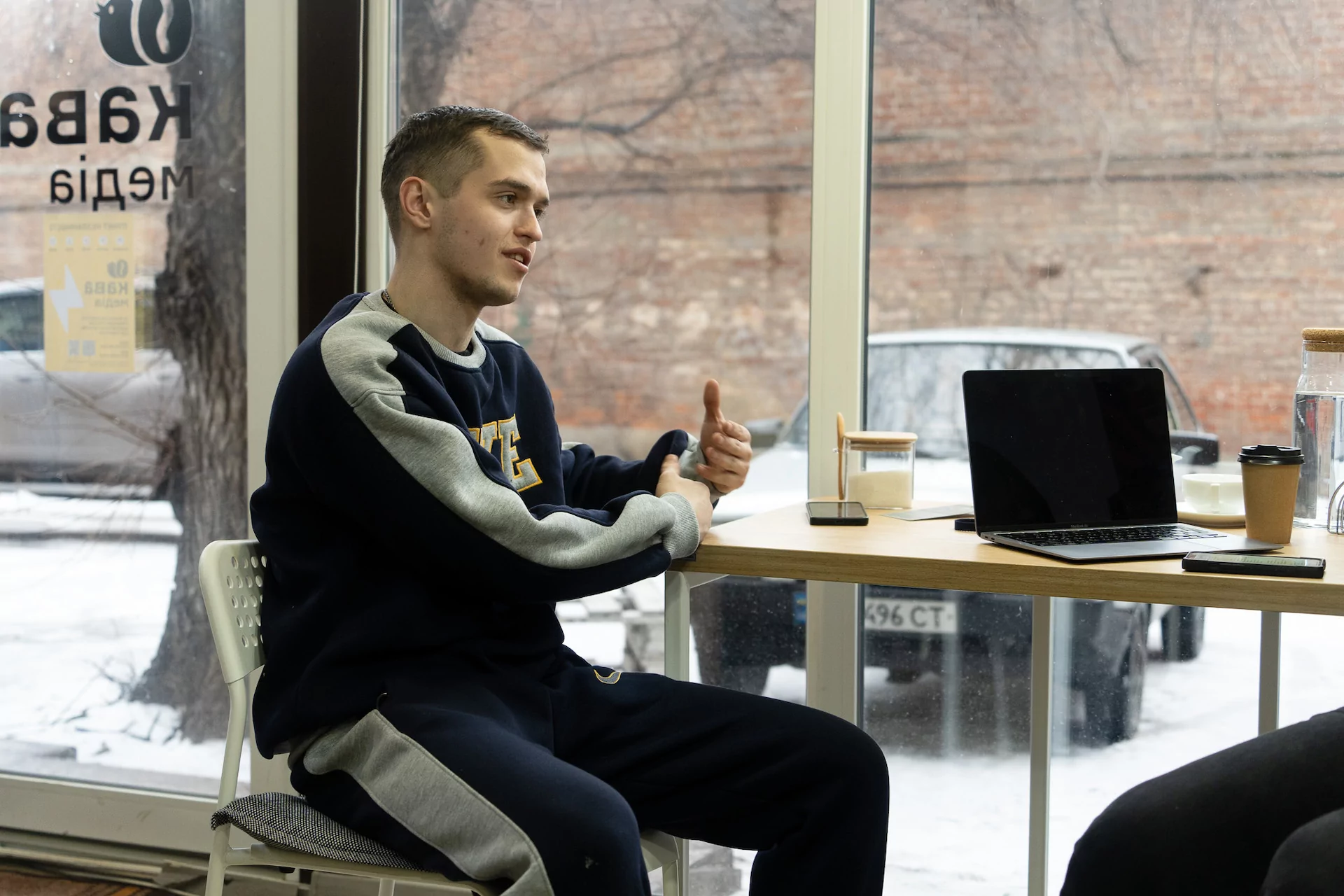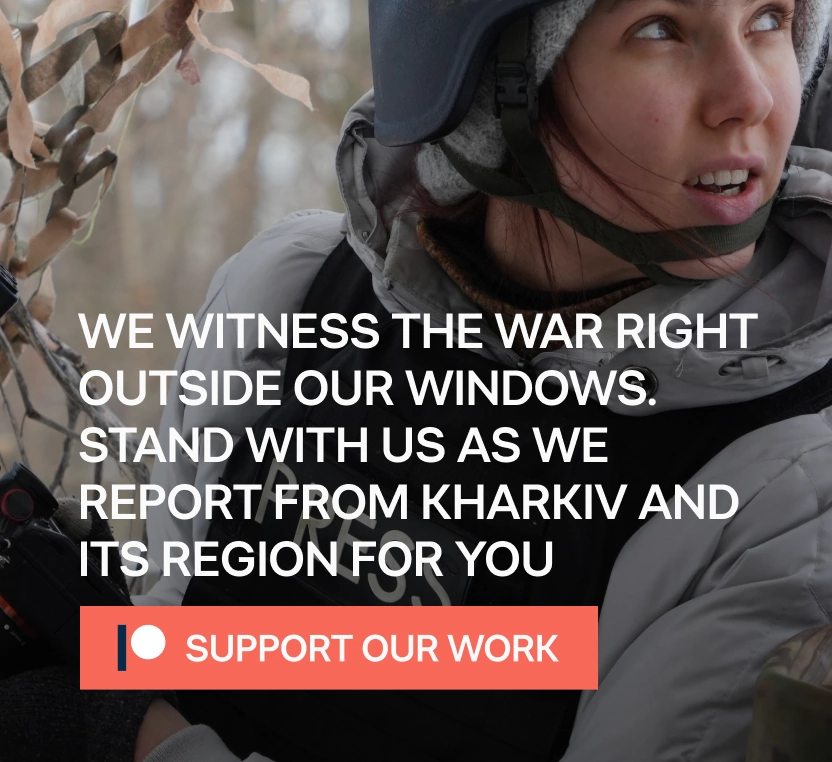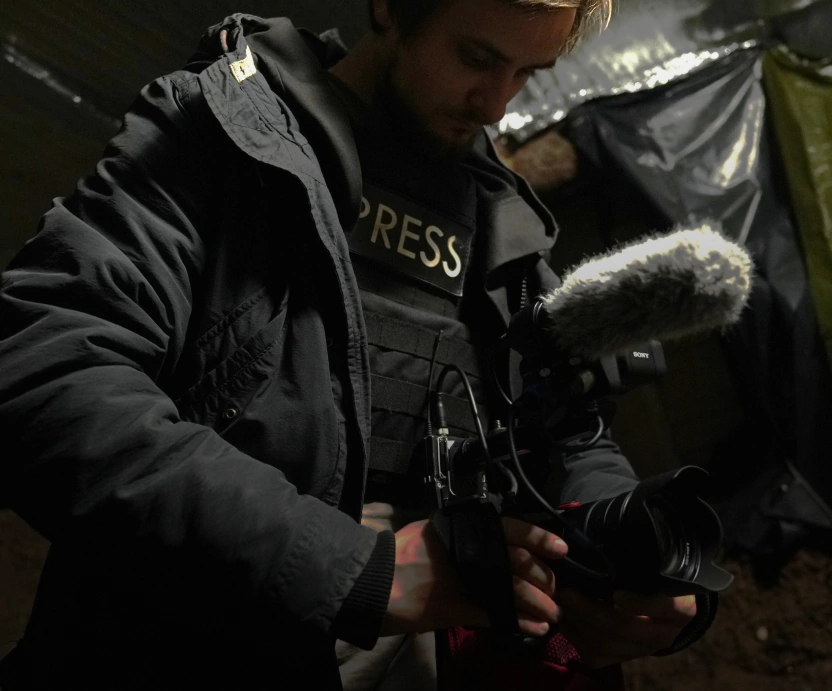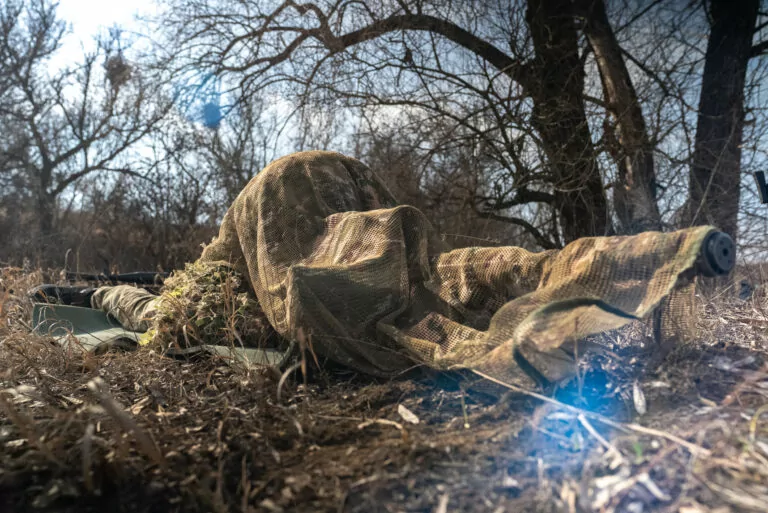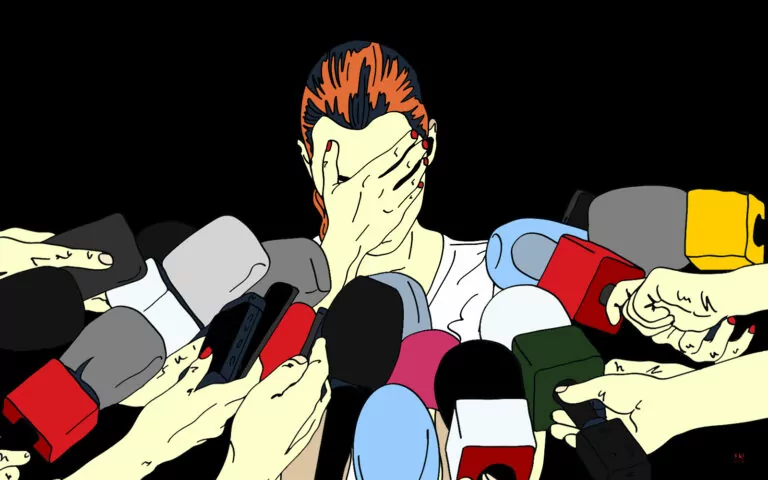Like many others, Roman Starchenko went to the military recruitment office with his father in the early days of the full-scale invasion. Roman has completed his regular conscription service and returned home, dreaming of working as a mechanical engineer with expensive cars. His father’s specialization is “tankman,” which he acquired in the Soviet Union and almost forgot for over 20 years.
Both took this step because they saw the human need to defend their country and loved ones. In this interview, we tell the story of people defending Kharkiv Oblast today and introduce their vision of the war.
Hello! Please tell us about yourself. We know today you are on vacation for the first time in your entire service.
I was actually on vacation last year for my wedding. There were a lot of things to take care of then. No one will let a soldier go on vacation without a good reason.
I don’t have a military specialty per se. I am a senior soldier [The higher military rank of soldier in the Armed Forces of Ukraine. Previously, this military rank in the Ukrainian army had the name “Gefreiter.” The senior soldier rank is higher than the soldier and lower than the junior sergeant – ed.]
“My military experience, funny as it may sound now, was gained during my conscription [mandatory military service in the Ukrainian army that men undergo at 18 – ed.] and in computer games.”
When I came to the recruitment office during the invasion, we were later handed rifles and uniforms and told to wait for orders on where to go. I also know of cases where people bought their own “collimator” [a name for a reflector sight – ed.] and other equipment and went to war. However, I believe that this doesn’t seem right.
Please tell us more about your background. You’re from Kharkiv, living in Northern Saltivka [one of Kharkiv neighborhoods most affected by Russian shelling – ed.], served until 2021, were preparing for civilian life, and everything changed… How did this change happen for you?
During my conscription service, there were exciting moments! For example, I saw guys from the “Azov” battalion; who came to our shooting range in 2020. We also have a special unit, “KORD,” which is the police, and I met with them. So during my conscription period, I met and talked to many people. It’s an interesting experience.
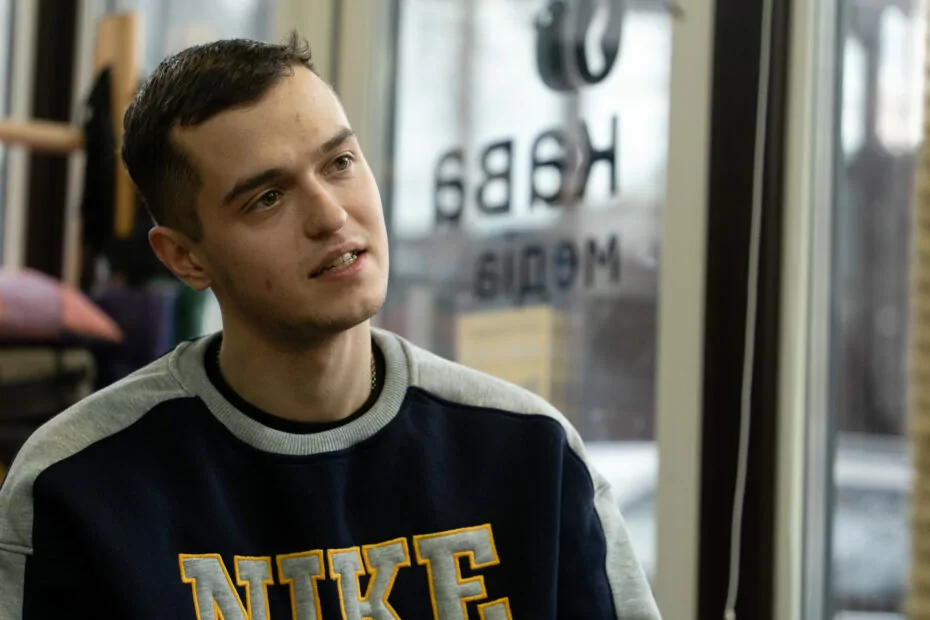
You served because you were drafted or because you wanted to?
Honestly, I didn’t have a strong desire to serve. But I understood I couldn’t avoid it; my father also insisted. So, overall, let’s say I wasn’t against it – I didn’t see anything wrong with it.
Of course, remembering myself and my thoughts before conscription… I can say they have changed, and priorities have become radically different.
At first, I was an ordinary soldier, but later they appointed me a duty officer because they noted that I was responsible. So I filled out documents from time to time. And in all my free time, I found, for example, the weapons in the storage room, and I tried to study them: rifles, cartridges, how they are loaded, and where they are placed.
I also went to training sessions. From our unit, everyone was taken to firing ranges and shooting ranges. It’s all in Kharkiv Oblast. There I met, I’m not afraid of this word, tough guys from “KORD,” looking at whom you can see that they know what they are doing. It was fun.
Before the shooting ranges, they showed us what to do and how to do it. I looked at it, and I thought, “Yeah! I did this in childhood.” You know, when you run around with a stick, play? It’s all simple and banal, really. There is no other way.
I did everything as shown, and it all worked out immediately. A man approaches me and says, “Did you serve somewhere?” I answer, no, nowhere.
“Service and skills are closely related to sports in all situations, both during peacetime and wartime. Any sport, from tennis to ballroom dancing, which I used to practice.”
And when you were in the military in 2021, were there discussions about whether Russia would attack?
They were closer to the end of my service. Probably about a month before I was discharged (which was on Dec. 1). I was hoping to get out sooner, and then these discussions started. Then they quieted down a bit.
Service ended, and I came home. At that time, my head was still in a state where you don’t fully understand what was happening: neither at home, on the street, or in the supermarket. It was a transitional state.
During conscription, soldiers are supposed to have vacations. We didn’t have that. There was still a stringent quarantine at that time due to COVID-19.
At the same time, there is conscription and contract service. And it was the contract soldiers who were easily going home and moving around the streets. For “draftees,” this veto was in effect, we walked around in masks.
“When, after 12 months, I first came home for 10 days, I adjusted and realized that I was home only on the fourth day. But honestly, I am sitting here and want to return to my military base as soon as possible.”
Because the situation is intense, the war itself, the fact that my father is also in the war, my friends are in the war, and I am in the city – we are separated.
Did you start looking for a job after finishing the service?
I had already found a job before leaving. I worked at a Lexus car service on Heroes of Labor [name of the street in Kharkiv – ed.]. After the service, I talked to my dad and found work at Land Rover and Jaguar [regarding work in their centers – ed.].
After the service, I worked only for one and a half months. On Feb. 23, they told me: tomorrow, you will get your first car, we will let you go, and you will work for yourself.
When did you first receive information about the war and were warned of an attack?
There was no prior communication, no internal chats, nothing. Everything changed suddenly. I was living my life, was interested in cars, and wanted to work.
On Feb. 24, at 5 a.m., the Russians hit the base where the communications officers were. A rocket hit and I woke up at 5 a.m. and didn’t realize at once what had happened. I woke up and saw a flash in the window. I didn’t even hear the explosion in Saltivka [neighborhood – ed.], I just saw the flash.
For the first six-seven days of the invasion, my family and I were in a basement in a garage, and on the eighth day, we went to a cottage in Kharkiv Oblast, thinking we could wait it out. We sent my sister and mother to Poltava [a city in central Ukraine – ed.]. And, of course, my father and I were already discussing that we needed to fight.
They even called him first, which was a bit offensive because I had just finished my military service!
My father is 50 years old and has a military specialty, he is a tank driver. But of course, he got it during the Soviet era. And he took the oath twice, once to the USSR and the second time to the Ukrainian people.
Today, we serve in the same unit. My father is also a rifleman now.
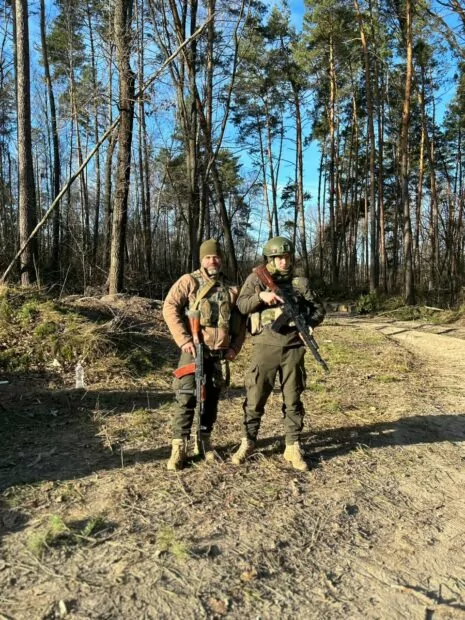
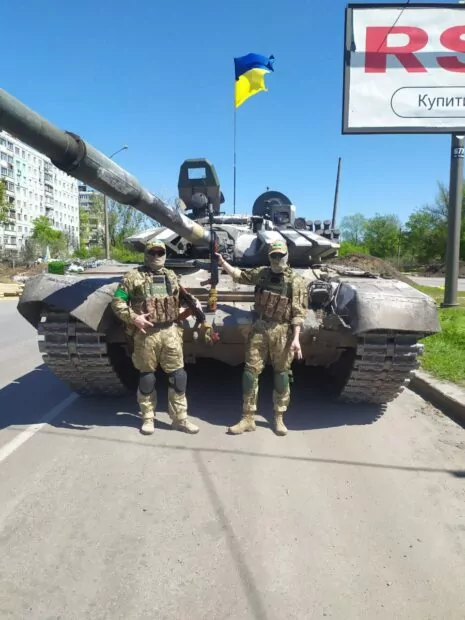
From the perspective of a military person, what happened with the army’s supply in the first months? Was it sufficient? And how did your integration into the military during active combat happen?
We went to the military recruitment office, and from there, we were sent to our units. They told us that we would wait a day or two for our military uniforms and rifles, and then they would tell us everything else. They gave us everything – uniform, sleeping mat, dishes, etc., but it took two weeks before we were given rifles.
And how did the communication with people of different generations and experiences feel? How did you “bond”?
I’ll tell you this: everyone who came to the military enlistment office in the first days came not for the money. At that time, there were no announcements about how much soldiers would be paid, what the benefits would be, etc. Honestly, I thought that it would be a quick operation.
And so, communication with these people was very loyal and kind. There were no conversations like “Have you served or not.” On the contrary, if one person knows something that another does not, they will kindly prompt it. There were no “I don’t need that” attitudes. We were like friends.
Over time, I saw people who found out how much they were being paid and decided, “No, I’d rather stay home.” In other words, there were unmotivated people for whom money was a significant factor.
Or I saw how receiving UAH 100,000 (~$2700) changed a person, not for the better.
Honestly, I don’t understand this.
Where have you been overall? Did you only defend Kharkiv?
The first place we were stationed was the exit from Kharkiv, northeast. We were stationed at the 602 neighborhood [part of Saltivka neighborhood – ed.]. Then we went to Staryi Saltiv [urban-type settlement in Kharkiv Oblast – ed.], the Russians were on one side of the river, and we were on the opposite.
There, for the first time, I really felt what shelling and rockets were like, what it’s like when they shoot at you. Then, you pay less attention each time: explosions, gunfire everywhere, everything is burning. But you already know what to do.
“For example, in three days, I adapted and understood when I needed to fall on the ground. And it didn’t matter what I was doing or where I was going at that moment.”
I was also at Piatykhatky [a neighborhood near the bypass road 26 km from the Russian border – ed.]. Russians didn’t reach it, but there were already Ukrainian positions and trenches 20 meters away from it.
In the 602 micro-district, we were a reserve group. In case something happened in Kharkiv, we were there.
“At the beginning of the invasion, the units had noticeable communication problems. When you go to the position, you cannot use WhatsApp or other messengers for safety reasons. You put it on airplane mode and go.”
In fact, the 602 neighborhood, through which the Russians did not enter (I only saw their Orlan drone once), is a kind of moral training camp. After that was Staryi Saltiv, we went there when the Russians left the left-bank part and moved to the right. That’s where the real war is: helicopters are flying when a tank is firing at you.
We were told about the “death road” in Staryi Saltiv, where literally shot-up cars and broken objects lie.
Yes, it exists. We arrived and found bulletproof vests in blood, broken bullets in blood, and much more.
We had our first losses at Staryi Saltiv. For example, one guy just came out to have a coffee (again, it’s clear that it shouldn’t be done), and a brick hit him in the head, and fragments of a missile strike hit his body. He did not survive.
How did civilians feel in Staryi Saltiv at that time? Because it seemed to me that there was a humanitarian catastrophe there.
Once, we entered a house, and the owner came out of the basement and asked, “What are you going to do here?” We were surprised; this was a very prepared person. He had everything necessary in the basement, which was not even issued to us. Meat cans, home wine stocks… He was a beekeeper.
Sometimes we hear about cases where individual Ukrainian soldiers steal something from civilians. What do you know about this?
There are different types of people. For example, if this douchebag is alone, he will just come and take it. But if another soldier with him says, “Don’t do that!” he won’t take it.
Of course, such behavior is discouraged and rooted out. If the commander finds out about it, nothing good will come. Everything depends on the commander.
Did the civilians in Staryi Saltiv support you? Because the soldiers from Izium told me that they felt that there were Ukrainians here; when the region was liberated, they slaughtered a pig for them. But they say they are afraid in the Donbas region.
We talked to residents, asked for a clipper to trim our hair, and helped them with food. At that time, we were given small dry rations called “Palianytsia.” We shared them with the locals. Sometimes we helped someone carry firewood.
When we first arrived, people were a bit afraid. But that’s natural: when you see a soldier with a gun in a helmet, you always feel a little scared, but the reaction is understandable. Overall, people were neutral toward us. They didn’t betray us or anything like that.
Some people were neutral towards Russian soldiers too. But I didn’t notice any pro-Russian sentiments there.
“Once, we saw a guy walking down the street with a bag. It was during the period of frequent air strikes. We told him to run and hide, but he replied, “No, I’m just walking from my garden.” Where on Earth was he going? People may be getting used to the war and the shellings and adapting to it.”
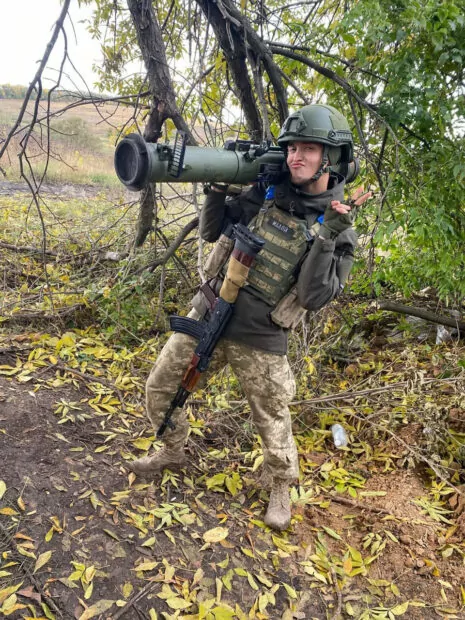
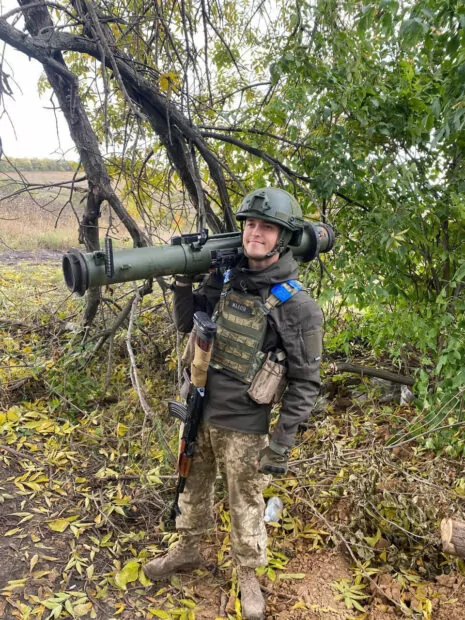
And how did the counterattack develop, and what did you do at that time?
At the beginning of September, we were in Cherkaska Lozova [a village in Kharkiv Oblast – ed.]. It felt like a kind of vacation camp after Staryi Saltiv.
In the 602 district, we met such grans, just ordinary women; you can’t do anything to them. She takes a photo of the soldiers, us, and our positions on her phone. You approach her, take her phone, and there are pro-Russian Telegram channels where the Ukrainian flag is divided and depicts a swastika. She says, “My grandson is in Russia, and he asks me to take pictures…”
She looked like a 50-year-old woman. And there were probably seven-eight of them.
And what did you do with them?
We immediately reported them to the Security Service of Ukraine.
And how did these women justify what they were doing?
They didn’t. “I just took photos; my son asked me to do that….”
There was nothing like that in Staryi Saltiv when we were stationed there. But that’s where we got our first Starlink.
Let’s go back to the beginning of the counteroffensive in September.
Okay, after Cherkaska Lozova, we went to Pytomnyk [rural settlement in Kharkiv district of Kharkiv Oblast – ed.]. And it was even worse there than in Staryi Saltiv. It was just a disaster.
We went there for reinforcement early in the morning. That is how it happens: you unload from one point and walk a long way – through forests and bushes, looking carefully around so that nothing flies there. You come to the position with a backpack, helmet, armor, and grenades.
When we arrived at these positions, we entered around 11 a.m. It must have been five minutes, and I didn’t even have time to take off my helmet when the tank started firing at us – from morning until evening. They shot at Pytomnyk randomly – left, right, it didn’t matter how to shoot, they just were hitting.
What is the logic behind such a chaotic shooting?
Imagine: you’re looking at a settlement where there isn’t a single intact building. Where would you shoot? Anywhere. Hit or miss – as luck would have it.
So then, by the way, we all (we already understood that we were receiving UAH100,000; there were already different situations) suddenly – hopped and gathered! I clearly saw that they would come to replace me and rescue me if something happened. They would stand up for me.
Once, my comrades and I split into groups, each taking their territory – six of us. It would probably take about 15 minutes to get to another position. But the guys managed to get there in under one minute, in the equipment that was quite heavy. We worked very cohesively then, and I was delighted.
Then, miraculously, we had more strength and motivation.
And how do these emotional swings happen on the front line? When you are initially more internally mobilized, then less? What affects this?
Honestly, I don’t feel them anymore. Shelling – zero feelings. No shelling – the same. You get used to it; there are no more strong swings.
But when we were leaving Pytomnyk, driving back, everyone was shouting. We’re just driving and screaming, laughing. We were happy to get away from there. It was an extreme reaction.
I can imagine what it’s like for people in Bakhmut when they leave their positions (some of our friends are there). The statistics are that 30 people went out, but only seven returned. It’s tough.
Because, of course, everyone wants to live no matter what kind of soldiers we are.
Become our patron to get exclusive content from our photo reporters.
In your opinion, how long should soldiers spend in such super-intensive battles?
Maximum for 15 days, not more.
“If you are in such a situation for over 15 days, you become indifferent to yourself.”
Because it’s all about internal strength and resources.
When it comes to Russians, they don’t care about rotating their soldiers. But here, it’s different: there aren’t many people who can fight. Few people have special skills like the “KORD,” National Guard, and the Armed Forces.
But I think our mobilization was successful because many people came despite their diverse backgrounds. Of course, there are alcoholics there too.
After Pytomnyk, we ended up at “OCHAH” [OCHAH Gymnasium in Kharkiv – ed]. That’s where we found the Russian trenches. They left a lot behind and just left. Obviously, they left tripwires, and one of our guys blew up on one. We found their command post from their positions, where they came from, and there were grenades, mines, etc. I almost blew up around the corner myself. I exhaled. I almost burst into tears because my emotions were overwhelming.
We found it all and marked it.
During the counterattack, we were stationed near Rubizhne [city in Luhansk Oblast, eastern Ukraine – ed.]. I wasn’t directly part of the assault brigade, but some people knew what they were doing very well. Or people who came to the military recruitment office and said, “We want to go to the very depths of hell,” and they ended up there (obviously, they had some training, too, because no one would want to go there with an unprepared person).
Where are you today – without giving exact geolocation?
Today we are in Kharkiv Oblast.
How do you see the situation in Kharkiv Oblast now? [As of March 2023.]
I can say that the counteroffensive is more of a Russian informational operation: they say, “There will be an attack there,” then after two weeks – “no, there.” It’s a tug-of-war. I understand, they do it so that we somehow cover the border with our not-so-large number of people. But we won’t be able to do that. And if we do, the border will be fortified, but the defense will be weak.
So now they are trying to find weak spots; they need at least something to go at the same Kharkiv again (although they have already gone at Chornobaivka 20 times), at Bakhmut, Soledar. They will constantly go somewhere.
But as for a direct global counteroffensive… I understand that it could happen. But it doesn’t look like it.
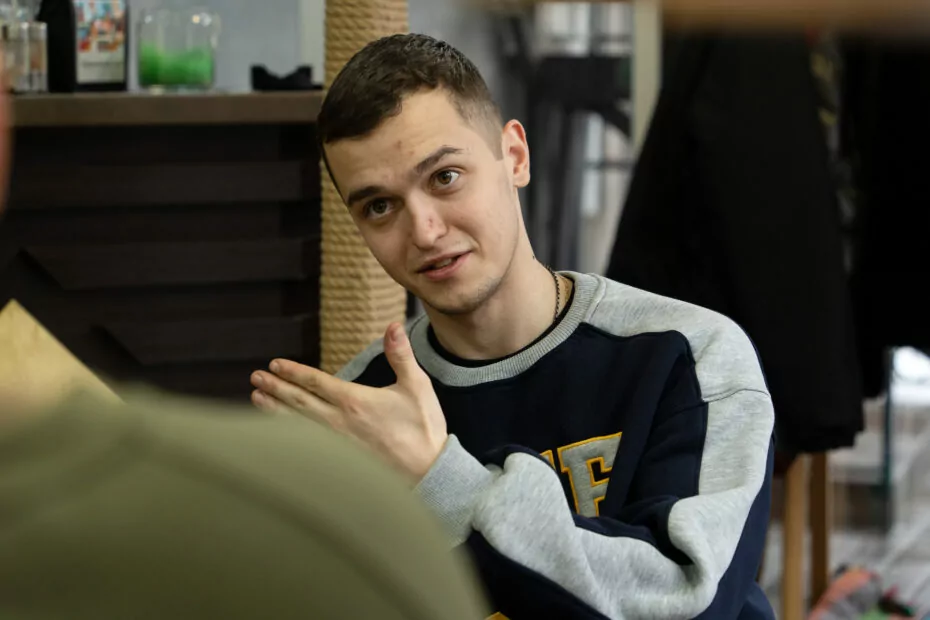
Interestingly, you essentially confirm the official position because General “Marcel” claimed that there was no counteroffensive and that it was an information attack.
Let me tell you about a phenomenon. Once we were in positions near the border, we arrived, settled in, and were not shelled. We built bunkers. Of course, they saw us. But when the car stopped coming, they started attacking us, which was intense.
One time we were buried in the soil. I suspect it was from a mortar attack (around 120 calibers) because large craters were left after that.
It was some time ago.
But now, when we were told there would be a counteroffensive, there was simply no shelling of our positions.
“They’re shelling Vovchansk, Ohirtseve [towns in Kharkiv Oblast – ed.], and launching heavy artillery elsewhere. It’s just pressure on people. Because they’ll say, “Oh my God, we’re so tired of this; let’s hurry up.” Of course, everyone is tired! So, it’s a means of information-psychological pressure.”
Now they talk about the importance of experienced sergeants during the war. Because first there are riflemen, then sergeants, then higher command. In TikTok videos, soldiers say, “We’re not being provided with this and that,” or “We’re being thrown somewhere.” And this happens when sergeants don’t do their job correctly.
I can comment on this. When we were at “OCHAH” before going to the abandoned Russian positions, they wanted to send us straight to attack the Russians. There were only 15 of us, and we had rifles, body armor, and helmets. The commander says, “We’ll support you now.” So, what do you mean by support?
Probably, a mortar.
Yes. A cannon, some kind of tank, at least an APC. And the guy tells us, “We’re going to have artillery preparation now. Get ready to attack the Russian positions.” They’re sitting on a small hill, so we have to go down (15 people) and somehow reach them.
There is such a grenade launcher, the SPG-9. So, support means to hit the Russians once, and that’s it. And they say, “Go ahead.” Of course, at this point, you will complain about your leader.
What motivates him to act this way?
Because they told him, “We will give you a medal.”
And now an example – law №8271 is being introduced, which states that you cannot refuse to obey a commander’s order. The bill has already been signed. And now, in such cases, a soldier will have no other choice. According to the law, there is no way to correct such a situation. If you don’t follow the order, you go to jail. The only question is, why should I go to jail if I came here to defend my country?
Could this law not work?
No, it can’t. It will work – but only to a certain point, when there will simply be no more people on the front lines who understand anything.
In your opinion, could it be that a commander doesn’t like a person and, using this law, sends them on a suicide mission?
As far as I know, that doesn’t happen. Not in our unit, anyway. If someone doesn’t like someone else, it’s a problem that will have to be dealt with after the war.
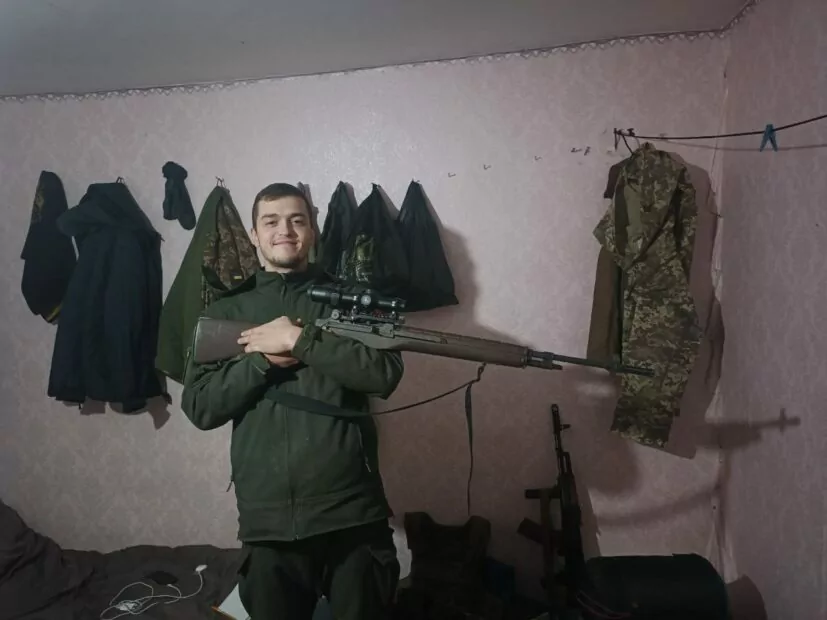
What are your plans for 2023? I heard there is a reform of the Territorial Defense Forces being prepared because people understand that even after a victory, there will still be a prospect of an attack from Russia.
Regarding this, I believe that Russia cannot attack Ukraine only when foreign military units are stationed inside our country. Why? Because even if we imagine that Ukraine becomes a part of NATO and the EU, it is unlikely that people from other countries will want to fight here specifically “for Ukraine” in large numbers. It won’t happen. But if they attack their soldiers or base, then the fatality will begin. Then people will already be fighting for their own [people – ed.].
Even if the war ends now, I am sure they will start something again in five or eight years. If not Russia, then Belarus. Today’s realities make it impossible to predict anything and rely on anything. In 1996, Ukraine gave up its weapons under a treaty, and where is it now? [In 1991, Ukraine gained independence and inherited the nuclear weapons from the USSR that were located and produced on Ukrainian territory. At that time, Ukraine had the third-largest nuclear arsenal in the world. On Dec. 5, 1994, the leaders of Ukraine, Russia, Britain, and the United States signed a memorandum to provide Ukraine with security assurances in connection with its accession to the NPT as a non-nuclear weapon state. – ed.]
How do you feel about those who are in the rear?
“Honestly, in my understanding, there is no such thing as “in the rear.” Because a person can be in the rear today and tomorrow in Bakhmut, the same goes for us. Today, we are on the border; tomorrow, we will go to Lviv to rest and then to Bakhmut.”
There is no rigid attitude towards those who are in the rear. I don’t like people who try to escape this situation. “Oh, I have a sick liver, I can’t do it, my heel is itching, my arms are short, my legs are long…” Sometimes I go to the supermarket and see men, big guys my age. And I have a question, what are you doing here? I understand that not everyone is born a “Kraken,” a member of the military intelligence or the National Guard. I am not a “Kraken” or a member of military intelligence myself. But we won’t achieve anything by posting “Glory to Ukraine!” on TikTok.
Sometimes even those who have already been mobilized and received UAH 100 thousand get a “hundred” and try to run away because they’re scared.
But some guys have, for example, hemorrhoids and scoliosis, but they want to be with us – and they run with us.
What are your personal plans? Do you want to be a mechanic after the war? Or a professional soldier?
First of all, during the war, I got married. And now, I have a conflict. I told my wife I wanted to join the army but understood that I would hardly be at home. I can’t say I want to join “Azov,” but I do want to join “KORD.”
Since childhood, I’ve always wanted to, you know, “pin down” some marginal guys, drug addicts, those who insult children, and so on. And not just punish them but really change the situation for the better.
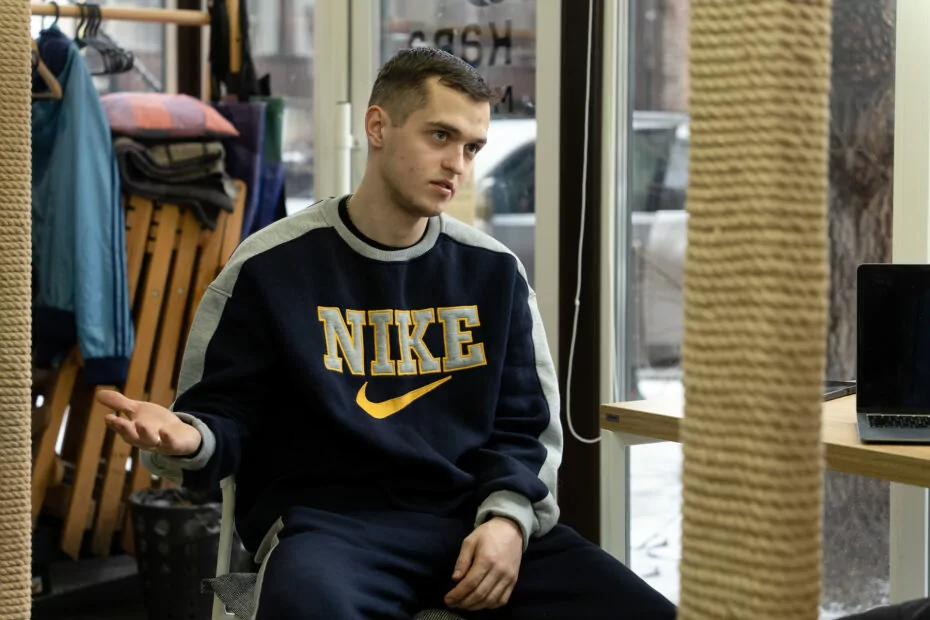
by Serhii Prokopenko and Olena Myhashko
translated by Anastasiia Kizyma
edited by Tetiana Fram
